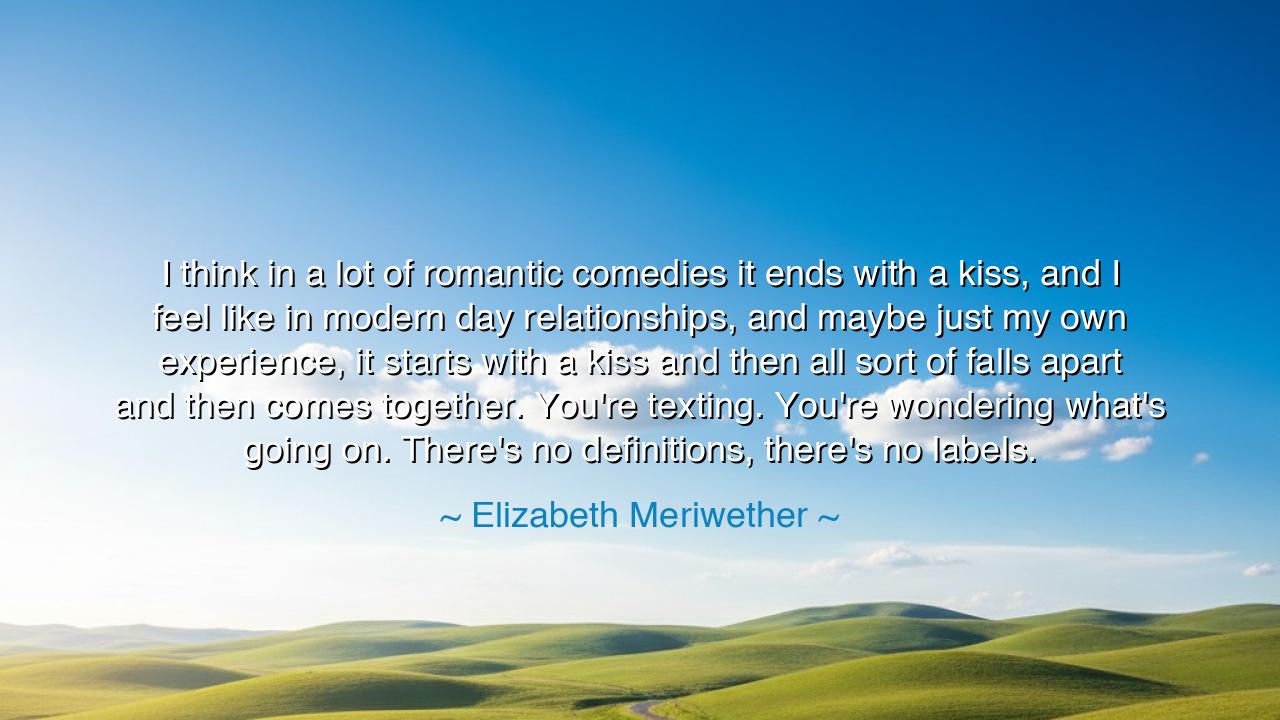
I think in a lot of romantic comedies it ends with a kiss, and I
I think in a lot of romantic comedies it ends with a kiss, and I feel like in modern day relationships, and maybe just my own experience, it starts with a kiss and then all sort of falls apart and then comes together. You're texting. You're wondering what's going on. There's no definitions, there's no labels.






In the words of Elizabeth Meriwether, "I think in a lot of romantic comedies it ends with a kiss, and I feel like in modern-day relationships, and maybe just my own experience, it starts with a kiss and then all sort of falls apart and then comes together. You're texting. You're wondering what's going on. There's no definitions, there's no labels," we find a profound reflection on the nature of modern relationships—a far cry from the neat, idealized endings of the traditional romantic comedy. Meriwether’s statement captures the chaos and uncertainty that often accompanies love in the contemporary world. In the past, love stories were defined by clear beginnings, middles, and satisfying conclusions. Today, however, love is often marked by ambiguity, fleeting moments, and the lack of labels—a dance between connection and confusion.
The ancients too understood the tension between idealism and reality in love. In the myth of Orpheus and Eurydice, love begins with a profound connection, but it is fraught with uncertainty and struggle. Orpheus, in his desire to bring Eurydice back from the underworld, finds himself torn between faith and doubt, his love ultimately undone by a single act of hesitation. Much like Meriwether’s description of modern love, the relationship between Orpheus and Eurydice begins with passion, but it becomes clouded by fear, misunderstanding, and the complexity of the human heart. This myth highlights a central truth about love: it is not always neat or easily defined, and it often involves ups and downs, confusion, and the necessity of growth.
The Greeks, through their complex portrayal of love in tragedy and comedy alike, often depicted romantic relationships as journeys that begin in passion but are tested by conflict and change. In Plato’s Symposium, love is presented not as a simple act of affection, but as a complex and transformative force—one that often begins with a desire but evolves into something deeper, more spiritual, and more challenging. The Greeks did not romanticize love as an easy, smooth ride to a perfect conclusion; rather, they embraced the messiness and transformative qualities that come with true connection. Much like modern relationships, Plato’s ideal of eros requires struggle and growth in order to reach its fullest potential.
In more recent history, Shakespeare too understood the complexities of love, as seen in Much Ado About Nothing. The relationship between Beatrice and Benedick begins with banter, and despite their apparent distaste for one another, they find themselves entangled in a romantic dance that is full of misunderstandings and confusion. Shakespeare, ever the master of portraying the complexity of human emotions, reveals that love does not follow a neat path. The characters must go through growth, self-discovery, and even moments of heartache before they can find resolution and understanding. This mirrors Meriwether’s insight into the unpredictability of modern relationships, where things rarely remain static or clear-cut. Love, as Shakespeare knew, is often a journey of revelation—not a tidy ending.
Meriwether’s remark about the modern relationship also highlights the modern trappings of love—the uncertainty and lack of definition that come with social media, texting, and the absence of traditional relationship markers. The very act of texting, a symbol of our connected yet disconnected age, exemplifies the anxiety and confusion that pervades contemporary romance. Texting replaces the once immediate conversations, where emotions were expressed clearly and directly, creating instead a space where the intention behind words is often left to interpretation, causing misunderstanding and overthinking. This mirrors the uncertainty of Meriwether’s modern-day love stories—full of hope, but also full of doubt.
There is also, however, a lesson to be found in the uncertainty of relationships. Just as the ancient myths and literature show us, love is not always a smooth path; it is an evolving journey, full of twists and turns, that forces us to grow and understand ourselves and our partners in new ways. The lack of labels and definitions in modern relationships—though it may cause frustration or confusion—also reflects a freedom that can lead to greater authenticity. Without the confines of traditional expectations, there is space for individual growth, and the possibility of a relationship that is more flexible and adaptable to the changes that life inevitably brings.
The lesson Meriwether offers is one of embracing the uncertainty and complexity of love. In life, as in relationships, we may seek clear answers and solid definitions, but the truth is that love, much like life itself, is fluid, ever-changing, and often unpredictable. Just as the ancient poets and philosophers have taught us, romance is not always about achieving a perfect ending but about navigating the complexities that come with sharing a life with another. Embrace the uncertainty and growth that come with love, knowing that even in the moments of confusion and doubt, there is the possibility of deeper connection and understanding.
In your own relationships, remember that love is not about finding the perfect label or always knowing where the road leads. Instead, focus on the journey—on the growth, the communication, and the willingness to embrace the unknown with someone else. Just as the ancients understood, true love is not found in the simplicity of a kiss or a perfect ending, but in the complexity, the struggle, and the transformation that love brings. Approach each relationship with openness, vulnerability, and a willingness to grow, knowing that the true beauty of love lies in its evolving nature.






AAdministratorAdministrator
Welcome, honored guests. Please leave a comment, we will respond soon